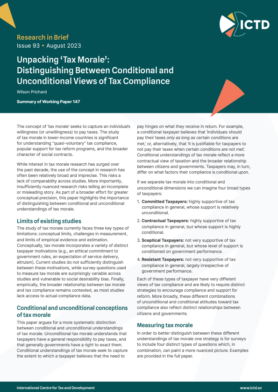Research in Brief 93
The concept of ‘tax morale’ seeks to capture an individual’s willingness (or unwillingness) to pay taxes. The study of tax morale in lower-income countries is significant for understanding “quasi-voluntary” tax compliance, popular support for tax reform programs, and the broader character of social contracts. While interest in tax morale research has surged over the past decade, the use of the concept in research has often been relatively broad and imprecise. This risks a lack of comparability across studies. More importantly, insufficiently nuanced research risks telling an incomplete or misleading story. As part of a broader effort for greater conceptual precision, this paper highlights the importance of distinguishing between conditional and unconditional understandings of tax morale.
